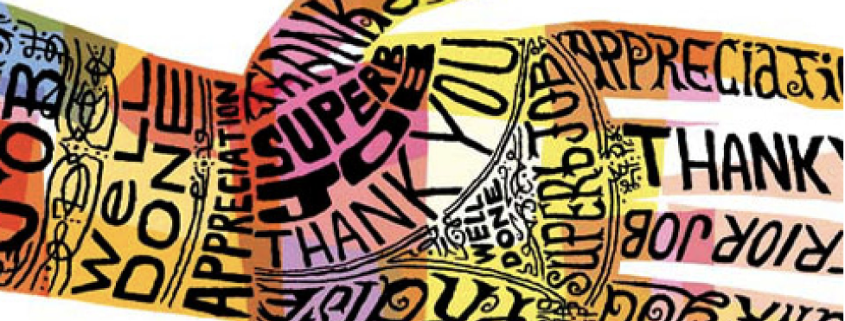The Withholding Leader – And The Power of Appreciation
In a recent coaching session, Linda told me an update on one of her critical projects. She was surprisingly pleased with how her director delivered, despite client chaos and demands. Since Mark’s performance had repeatedly come up in our sessions as a source of frustration, I asked Linda if she congratulated him. Her answer was an unabashed “No.”
I’d like to say it’s rare that I see leaders withholding appreciation for the good work their people do, but that’s not the case. It happens all too often. And since we’d probably agree that showing appreciation in small ways is pretty easy to do – then why might leaders, even you – not be so generous with it?
My experience is that whether it is conscious or subconscious, often leaders withhold appreciation because they believe one or more of the following:
- In the busyness or bigger picture, showing appreciation is not a priority.
- No one thanks me, so why should I go out of my way to praise others?
- I don’t want to praise good work from a person who has other areas that need work – it may seem like I condone those.
- I have extremely high standards, people need to over-deliver to get my attention.
Being super tough on themselves these leaders would do well to begin by acknowledging themselves.
Any of these beliefs will block appreciation AND can be contagious to those in the leader’s orbit — spurring a unappreciative cultural effect.
So why the need for shifting this withholding habit to one of greater appreciation? I’m certain you’ll get a sense that each reason for greater appreciation has taken on even more importance since the pandemic – as we had become more separate and many of us, less “seen.”
It hits at the core human need of belonging.
When something we’ve done is recognized (“It was so helpful to the team that you handled that,” or even better, someone recognizes an aspect of who we are, “I appreciate how you handle tough situations so diplomatically,” first and foremost, we feel seen. You may or may not remember the last time someone complimented you in a meeting, but it likely felt good. Even a small but sincere “Great point!” says we added value, and stokes a sense of belonging – the need for which is hard-wired into our DNA.
It fuels purpose, an intrinsic motivator.
Acknowledgement of someone’s impact can affirm we’re contributing to something bigger than ourselves. In 2003, Dan Pink drew from decades of research on intrinsic motivators and distilled it to three factors, expressed in his book Drive, and his famous Ted talk on the same topic. They are: Learning, Autonomy, and what appreciation reinforces – a Sense of Purpose. When I work with an executive on their desired aspirations and legacy – it is incredibly energizing. The discussion often begins with what they or others consistently appreciate about them and pursue them for.
Giving thanks, praise and acknowledgement feels good all around.
Showing appreciation to someone is like giving a gift. When give or receive a gift, both giver and receiver experience a jolt of the “feel-good” hormone, oxytocin. Conversely, we experience cortisol when we’re given negative feedback. As leaders, we need to receive and give both types of input — we just need to be careful how we deliver it. Our brains have a negative bias, and we attach to the negative. We can easily let it overshadow the positive, which can constrain our thinking or deflate our attitude. With this knowledge, we can see even more why appreciation is an important piece of the motivation puzzle.
Appreciation creates a positive work culture. Especially important to our times, leaders and teams must pay even greater attention to cultivating constructive and trusting work cultures. Building in team rituals that include acts of appreciation, reaps all of the above benefits, with the bonus of stoking engagement, social safety and positivity. Remote work, and our current state of overload can mitigate this happening organically, but they are also why the need for appreciation is even more compelling. By carving out moments during a 1:1 or a team meeting to stop to recognize each other, we can create collective energy that is hard to come by if we leave it to chance. And by the way, as a leader, be sure to solicit input (including positive) from your people. You need to hear it too.
As an added note, its especially meaningful to learn how others uniquely wish to be appreciated. It’s easy to assume others want to be appreciated they same way we do. Yet, for example, naming someone’s good work in a big meeting may be great for one person, and mortifying to another. Some may think a quick cash bonus or gift is a crowd-pleaser, yet some studies show more people value a sincere, handwritten note. And if you are not sure what your own people may want – maybe try an appreciation style assessment. You can learn how to speak the appreciation-language of your people, and even use the team report to plan rituals or events that hit the mark on all of the team’s diverse appreciation styles.
What are some of your favorite ways to appreciate others? Since the pandemic are you trying anything new? As important, how do YOU like to be acknowledged?


Our business unit leader wrote hand-written notes to thank each of us after the end of a long project – with specific call outs about what she appreciated about our contribution. It meant a lot to people.
I’m a big believer in the handwritten thank you note at work. It’s a dying art but I agree, so appreciated.